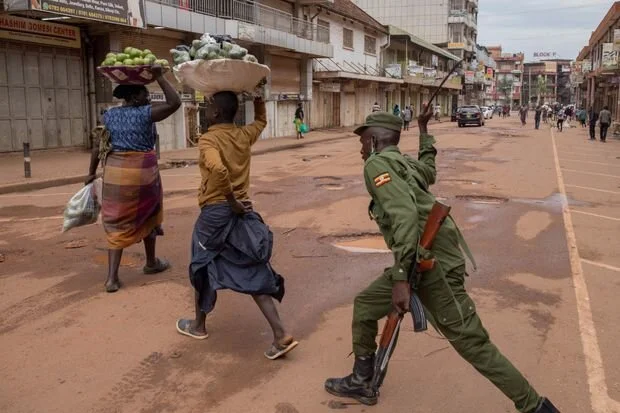On March 22, Rwanda became the first African nation to institute a complete lockdown in light of the coronavirus pandemic. President Paul Kagame, who has ruled for over 20 years, ordered civilians to work from home and closed the country’s borders. Less than a week later police fatally shot two men walking outside in violation of restrictions.
Rwandan police are not alone in resorting to violence to impose orders. A thirteen-year-old Kenyan boy was killed by a stray bullet, as authorities enforced the nightly curfew. Police and paramilitary groups in Uganda viciously beat people who failed to comply with market closures and transportation bans, sometimes using sticks and wire.
Increased brutality may be symptomatic of higher-level political machinations. The coronavirus pandemic gives authoritarians across the African continent an ironclad excuse to tighten their grips on power, while the world’s attention in diverted.
In Malawi, for example, President Peter Mutharika was quick to halt all gatherings of more than 100 people and declare a national emergency. These measures, however necessary, were also an expedient means of stopping the protests that have rocked his regime since the disputed 2019 election. Mutharika also censored education programs on COVID-19 prevention, conducted by opposition leaders, stating that all information must come from his ministry of health.
President Yoweri Museveni of Uganda, who has clung to power for 34 years, forbade opposition politicians from distributing relief items to vulnerable populations, threatening all who defied him with attempted murder charges. Museveni’s most formidable challenger, Robert Kyagulanyi, better know as Bobi Wine, had previously donated food to people living in Kampala’s slums.
Ethiopia’s reformist Prime Minister Abiy Ahmed postponed the country’s August elections indefinitely. It is unclear how this will affect a fragile democratic transition, but it could begin a dangerous trend. According to scholars at the Atlantic Council, Presidents in Burundi, Tanzania, and Côte d’Ivoire are likely to cancel or delay elections as the coronavirus pandemic rages.
African leaders making power grabs are in good company. Israeli Prime Minister Benjamin Netanyahu postponed his own corruption trial, citing the coronavirus pandemic. And an emergency decree now gives him unprecedented surveillance powers and prevents the opposition-controlled parliament from convening. In Hungary, populist leader Viktor Orbán can now rule by decree, suspending parliament and bypassing multiple democratic institutions.
While the coronavirus reshapes politics around the world, it also serves as reminder of just how dangerous unchecked power can be.
Cameroon’s President Paul Biya has disappeared from public life entirely, even as panic over the coronavirus grows. He’s been in power since 1982, amidst allegations of intimidation and election fraud.
Opposition leader Maurice Kamto criticized Biya’s absence and lack of accountability in a statement published on his website. “Together we can see the failure of Mr. Paul Biya as President of the Republic,” Kamto said. “No army can win a war with the sole effigies of a commander-in-chief that the troop neither sees or hears.”
President John Magufuli of Tanzania has cracked down on dissent since assuming power in 2015, regularly imprisoning journalists and attacking opposition leaders. The country is ranked 118 out of 180 on Reporters without Borders' World Press Freedom Index . Magufuli recently encouraged Tanzanians to worship en masse because the coronavirus, “cannot survive in the body of Jesus.”
There is limited space for opposition in Tanzania, even as the President spouts falsehoods. Khalifa Said, a journalist for a prominent media organization there, tweeted that Magufuli’s misleading reaction meant that he should be held accountable for any COVID-related deaths. Said was subsequently fired.
Reporters have come under fire elsewhere on the continent. Anjan Sundaram criticized Kagame’s response to the pandemic on Twitter and claimed Rwanda was falsifying recovery reports. Sundaram was vilified by an army of online trolls, all questioning his credibility as a journalist. The Guardian’s Ruth Michaelson was kicked out of Egypt for reporting that there may be more cases of COVID-19 there than officially recorded.
The precise political and social impacts of the virus are uncertain, and it is difficult to determine exactly how the pandemic might undermine various democratic movements. In a brilliant piece of analysis for Johannesburg’s Mail & Guardian, Africa editor Simon Allison described the coronavirus as a political wildcard.
Nonetheless, authoritarianism has already proved dangerous to public health initiatives, as it allows for the easy manipulation and control of crucial information. Thus, it is vital to continue pay close attention to the actions of leaders on the African continent — and elsewhere — as well as to the activists and dissidents courageously working to share information under threat.
Sophie Neiman (@sophie_neiman) is a freelance journalist and photographer, reporting on politics, conflict and human rights. Her work has appeared in World Politics Review, African Arguments and the Thomson Reuters Foundation. She was previously based in Uganda and Rwanda and currently lives in the United States.
DISCLAIMER: The views expressed in this publication do not necessarily reflect the views of Vanguard Africa, the Vanguard Africa Foundation or its staff.

